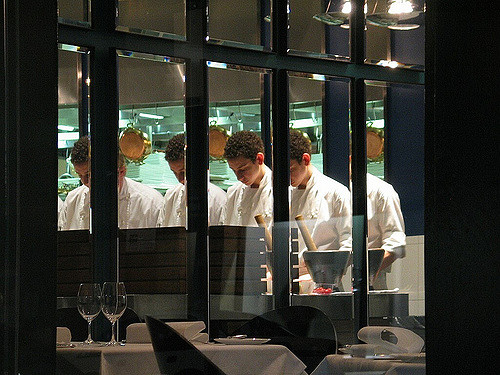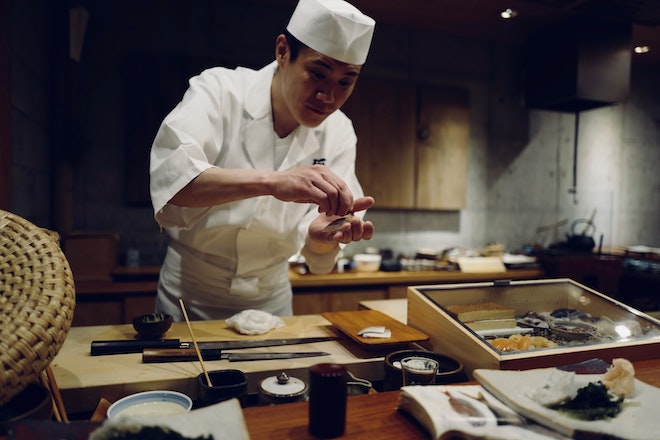Chen Sifu crossed the intersection, between the supermarket and the house-turned-dormitory where local restaurant owners rented rooms, to house help they hired from The City. The October air was cold. The wind cut. Chen zipped his jacket up to his chin, and burrowed his neck deep into the thin cotton. He hustled towards the supermarket. His pace gave away the discomfort that his facial expression didn’t reval. It was impassive, as always. Closed, wide lips. Round eyes that registered surprise or excitement only after a 2-second delay, as if hooked up by loose connections.
He wore that same expression while he battered chicken tempura in the deep fryer, rolling the thin pink strip of poultry into the tempura bits floating on vegetable oil, like snowflakes atop an ice rink.
Nor did it change when Big Chef scolded him for being stupid or incompetent. His glassy eyes absorbed the brunt without blinking, like they couldn’t fathom the situation – or didn’t want to. It was the same when Alan – skinny, Sushi Chef Alan – bullied him for the Chinese newspaper or for his seat on the empty soy sauce container. Chen’s wrists were thicker than Alan’s neck, and he could wring him out if he set his heart on it.
Instead, he acquiesced, but not without that unwavering stare, which forced Alan’s glare to the ground, his mumbled words directed at the floor as he snatched the inky paper or assumed his position on the makeshift chair.
Chen sang while working, the expression pouring from his voice compensating for its absence in his face. You often heard Beijing opera from the basement, while he wrapped large scoops of green tea ice cream into fluffy, yellow pound cake, but mostly he sang contemporary songs, while cutting vegetables or scrapping burnt scraps off the stove.
Allison asked me once, bemused, “What is he singing? Like, Chinese folk songs?”
I pictured the accompany music video to the particular tune; one of those videos with shaking bottoms and bare mid-riffs. I shook my head.
Not really, I told her.
It was Tuesday, though – his one day off a week – which explained why his blank slate of a face bobbed its way to the supermarket. As far as destinations went, he didn’t have many other options in Slingerlands, during the middle of the week. Especially without a car, and armed only with vegetable names and versatile English expressions like, “No good,” “Thank you very much,” and “What the hell?” These days, all the chefs from The City owned laptops, so they could stream Chinese programs or movies, but realistically that kept them occupied for only so long. Even after sleeping in late and the luxury of a long, hot shower, they needed something else to occupy their time besides staring at a laptop screen with a viewable size of 12.35 inches and pixel pitch of 0.25mm.
Hopping on bus line 86 took them to the mall, but that got old (and expensive) after a while.
So besides heading to the supermarket – which lacked temptations like the Express store and the fancy gadgetry of Brookstone – what else was there to do? He’d rather work, honesty, to earn more money. Boss already told him no, though, he couldn’t work seven days a week. He wanted him to rest.
Inside the supermarket, he wandered through the bright, clean aisles. He stared at row after row of cereal boxes, canned soups, bottled Spaghetti sauces, salad dressing, and ice cream. Dessert boxes with pictures of sinful chocolate cake. Packages of uncooked chicken, categorized in seemingly infinite permutations: bone-in or boneless, skinned or skinless, thighs or breasts or drumsticks, farm raised or local or all natural – it all extended far beyond the way he used to buy his poultry (“dead or alive?”)
Every English word, every recognizable brand and vibrant packaging, the wealth of it all, reminded him of why he was here, in upstate New York. It reminded him why a 14-hour plane ride and a $1200 ticket separated him from his wife. Why 95 percent of his pay, earned through 12-hour works days, he wired across the ocean, where he’d never see it again. Why when his son married a few weeks ago, he was absent from the wedding. Instead, he was working two skillets, trying to catch up with the dinner rush.
He certainly wasn’t here because they needed his valuable cooking skills. He wasn’t a talented chef; he knew that. The first time he cooked them dinner, pork loin with bok choi in oyster sauce, the dish came out so salty, it was barely edible. The other cooks ruled it out to differences in style. He probably wasn’t used to the southern style of cooking, they figured.
For lunch the next day, he made wheat noodles in a peanut sauce – a distinctly northern dish. He spent an hour pulling and cutting his own noodles, then another 30 minutes refining his sauce, tasting it with his index finger after every ingredient, trying to get it just right.
The finished product tasted like plain spaghetti noodles doused with watery peanut butter.
He wasn’t getting paid for his culinary talents. So he compensated for it by doing anything you asked him to do.
Start keeping inventory of all kitchen items? No problem.
Wash dishes and scrub the walls? Absolutely.
Get on the 8-foot ladder and hang Christmas lights around the building in 15 degree weather? I’d love to.
He compensated with his good temperament. By never getting upset. By singing.
Chen picked something out of the grocery store – something for dessert, something foreign that looked deceptively delicious, like a chunk of Angel food cake or sweet cherry pie. He braved the cold once more, and crossed the intersection back to the unheated dormitory, where he prepared his dinner, and grimaced as he downed his own cooking. Then ate his dessert, and grimaced at how sweet it was.
He watched his second movie for the day.
He sang a little.
Then, more out of boredom then exhaustion, he laid down on the mattress with the sagging middle. The mattress where countless other chefs before him had laid their tired bodies. He pulled the sleeping bag he used for a blanket over his body, and tried to sleep, eagerly awaiting to return to work in the morning.
PhotoCredit: Lana L.


